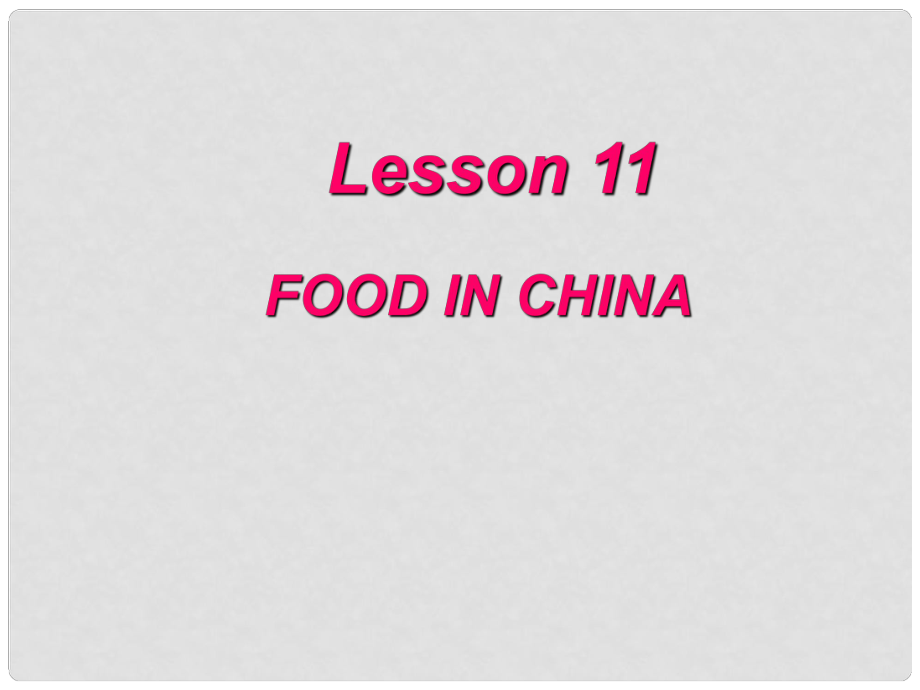《七年級(jí)英語(yǔ)下冊(cè) Unit 2 Lesson 11 Food in China課件 (新版)冀教版》由會(huì)員分享����,可在線閱讀,更多相關(guān)《七年級(jí)英語(yǔ)下冊(cè) Unit 2 Lesson 11 Food in China課件 (新版)冀教版(31頁(yè)珍藏版)》請(qǐng)?jiān)谘b配圖網(wǎng)上搜索����。
1����、Learning Aims教學(xué)目標(biāo):教學(xué)目標(biāo):1.words: online, especially, treasure, end, product, worth, taste, true, once重難點(diǎn):重難點(diǎn):Know about Chinese foodsNew Wordsonline adj. 在線的��;聯(lián)網(wǎng)的在線的���;聯(lián)網(wǎng)的especially adv. 尤其�����;特別尤其���;特別 treasure n. 寶物���;財(cái)富寶物���;財(cái)富end n. 最后;末端最后�����;末端 product n. 產(chǎn)品;結(jié)果產(chǎn)品�����;結(jié)果worth adj. 值得��;有價(jià)值的值得���;有價(jià)值的hand-made adj. 手工的手工
2��、的taste v. 嘗起來(lái)�;品嘗�����;體驗(yàn)嘗起來(lái)����;品嘗;體驗(yàn)true adj. 真實(shí)的��;正確的真實(shí)的��;正確的supper n. 晚餐晚餐once adv. 從前��;一度;一次從前�;一度;一次ListeningListen and write true (T) or false (F).1 1. Beijing Duck takes a lot of work to male. ( ) 2. Some people eat noodles for breakfast in China. ( ) 3. Paul once had Beijing Duck in his city. ( )Listen a
3���、nd answerE-chatter(Jenny) Hello, everyone! I just got back from a trip to the Silk Road in China.Everything was great - especially the food! My favourite dishes were Beijing Duck and Lanzhou noodles. Whats so special about these two dishes? Well, they have a lot of history behind them. Jenny goes on
4���、line to tell others about the food in China. Beijing Duck is really a Chinese treasure. It takes a lot of work, but the end product is worth it. Lanzhou noodles are long hand-made noodles. They look good and taste great! Do you want to taste these wonderful foods from China? (Dora) Your story is ver
5、y interesting. I saw a show about Lanzhou noodles on TV. The man made the noodles so fast. It was like magic! (Monica) I heard that, in China, some people eat noodles for breakfast. Is this true? (Jenny) Yes, its true. Many people war noodles for breakfast. Sometimes they eat them for lunch or suppe
6�、r, too. And I know why - they taste REALLY good! (Paul) I once had Beijing Duck in our city. Can I find Lanzhou noodles here? I will try.Language pointsIt takes a lot of work, but the end product is worth it.他花費(fèi)了很大功夫,但是最后的成果是值得的����。【解析【解析】 句式句式it takes . to do . 意為意為“做某做某事花費(fèi)事花費(fèi)”�����,此時(shí)要用此時(shí)要用it作形式主語(yǔ)���,而將真作形式主
7、語(yǔ)����,而將真正主語(yǔ)(動(dòng)詞不定式)放在后面正主語(yǔ)(動(dòng)詞不定式)放在后面�����。e.g.It takes me half an hour to walk to school every day.每天步行去學(xué)校要花費(fèi)我半個(gè)小時(shí)的時(shí)間�����。It will take some more work to finish this job.完成這項(xiàng)工作需要進(jìn)行更多的工作�����。Sometimes they eat them for lunch or supper, too. 有時(shí)他們也把他們當(dāng)做午餐或者晚餐�����?��!窘馕觥窘馕觥?句中的介詞句中的介詞for加上名詞或代詞后作加上名詞或代詞后作狀語(yǔ),意為狀語(yǔ)�����,意為“為了為了”e.g.T
8���、hey went to London for their holiday.他們?nèi)惗囟燃倭?�。Review 動(dòng)詞的過(guò)去式動(dòng)詞的過(guò)去式有規(guī)則變化和不規(guī)則變化兩種形式��,動(dòng)詞的過(guò)去式有規(guī)則變化和不規(guī)則變化兩種形式�,一般是在詞尾加一般是在詞尾加ed構(gòu)成。不規(guī)則變化的過(guò)去式?jīng)]構(gòu)成����。不規(guī)則變化的過(guò)去式?jīng)]有特定的規(guī)律,需要特別記憶�����。過(guò)去式用于一般有特定的規(guī)律��,需要特別記憶��。過(guò)去式用于一般過(guò)去時(shí)態(tài)中���。過(guò)去時(shí)態(tài)中��。1. 一般情況下���,在動(dòng)詞的詞尾加ed構(gòu)成。如:walkwalked, offeroffered, joinjoined2. 以不發(fā)音字母e結(jié)尾的���,直接加d構(gòu)成�����。如:livelived, hatehate
9�、d, escapeescaped規(guī)則變化的過(guò)去式3. 以重讀閉音節(jié)結(jié)尾��,并且詞尾只有一個(gè)輔音字母的�����,要先雙寫(xiě)這一字母再加ed���。如:stopstopped,preferpreferred4. 以“元音字母 + y”結(jié)尾的直接加ed���,以“輔音字母 + y”結(jié)尾的應(yīng)先將y改為i再加ed構(gòu)成。如:playplayed, copycopied, trytried, carrycarried規(guī)則變化的過(guò)去式1. 原形和過(guò)去式相同���。如原形和過(guò)去式相同���。如:花費(fèi) costcost切割 cutcut打 hithit傷害 hurt hurt2. 過(guò)去式字母過(guò)去式字母o改為改為a。如。如:成為 become bec
10�����、ame來(lái) come came不規(guī)則變化的過(guò)去式3. 過(guò)去式為過(guò)去式為ought結(jié)尾的�����。如結(jié)尾的���。如:帶來(lái) bring brought買(mǎi) buy bought戰(zhàn)斗 fight fought想 think thought4. 過(guò)去式為過(guò)去式為aught結(jié)尾的���。如結(jié)尾的。如:抓住 catch caught教 teach taught不規(guī)則變化的過(guò)去式5. 過(guò)去式將過(guò)去式將eep改為改為ept��。如��。如:保持 keep kept打掃 sweep swept6. 過(guò)去式字母過(guò)去式字母i改為改為a��。如�。如:下沉 sink sank游泳 swim swam不規(guī)則變化的過(guò)去式7. 過(guò)去式字母過(guò)去式字母ow改為改
11、為ew���。如�。如:知道 know knew投擲 throw threw吸 blow blew種植 grow grew不規(guī)則變化的過(guò)去式Each word below has two different meanings beside it. Both meanings are correct but only one meaning is used in this lesson. Tick the appropriate meaning.21. dishes special kinds of meals or food plates and bowls2. treasure something
12、very expensive something very special3. taste to eat a bit of food the flavor of food4. product goods for selling result from workingRead the lesson and fill in the blanks.3Jenny just got back from a trip to the Silk Road. She goes online to tell others about the food in China. Her favourite _ were
13����、Beijing Duck and Lanzhou noodles. They have a lot of _ behind them. Beijing Duck is a true Chinese _. Lanzhou noodles are hand-made noodles. They _ delicious.dishestreasurehistorytasteRewrite these sentences below in the simple past tense. Then mark the regular verbs with () and the irregular verbs
14���、with ().41. The food looks good. 2. He eats cereal for breakfast.3. They work hard.4. She finds many books in the library.5. It takes a long time to make dumplings.The food looked good. He ate cereal for breakfast.They worked hard.She found many books in the library.It took a long time to make dumpl
15���、ings.Work in pairs. Talk about different dishes you know. Whats your favourite dish? Whats in it? Is it easy to make?5 Poutine is a Canadian dish. Poutine is made with French fries, cheese and gravy. Its easy to make and its delicious!Exercises!1. The soup t_ delicious. Would you like some?2. Mr. Zh
16、ang gave us a short talk at the e_ of the meeting.3. There are a lot of t_ in the Palace Museum.4. Danny always goes o_ to talk with his friends on QQ.5. Is this answer t_ or false, Li Hong?I. 根據(jù)根據(jù)首字母提示寫(xiě)出單詞首字母提示寫(xiě)出單詞��。astesndreasuresnlinerue1. 這本書(shū)很值得買(mǎi)�。你想買(mǎi)一本嗎?這本書(shū)很值得買(mǎi)��。你想買(mǎi)一本嗎����?This books is _ _ _. Do you
17、want to buy one?2. 李明是用手工做的這個(gè)風(fēng)箏���。李明是用手工做的這個(gè)風(fēng)箏��。Li Ming made this kite _ _.II. 根據(jù)漢語(yǔ)完成句子根據(jù)漢語(yǔ)完成句子��。worthtobuybyhand3. 很多人晚飯吃面條�。很多人晚飯吃面條。Many people eat noodles _ _.4. 你昨天為什么沒(méi)來(lái)上學(xué)��?你昨天為什么沒(méi)來(lái)上學(xué)��?_ _ _ come to school yesterday?forWhydidntyousupperHomeworkHomeworkTalk about different dishes you know with your partner.
 七年級(jí)英語(yǔ)下冊(cè) Unit 2 Lesson 11 Food in China課件 (新版)冀教版
七年級(jí)英語(yǔ)下冊(cè) Unit 2 Lesson 11 Food in China課件 (新版)冀教版

